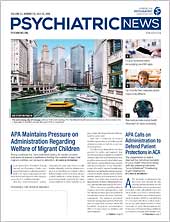Electronic medical records (EMRs) may be a useful way of identifying patients that could benefit from a psychiatric consultation, suggests a study in the May issue of Psychosomatics.
Lead author Christine T. Finn, M.D., an assistant professor of psychiatry at Dartmouth Geisel School of Medicine, designed an EMR reporting tool to screen patients for psychopathology and behaviors that might interfere with treatment, such as serious mental illness, substance use disorders, violence, and intentional self-injury.
“The idea is to be proactive,” Finn told Psychiatric News. “This reporting tool identifies patients who might benefit from a psychiatric consultation, rather than waiting for the primary care team to make that identification and then request a consultation.”
The researchers pulled EMR and billing data on all patients admitted to Dartmouth Hitchcock Medical Center, a 400-bed academic medical center in rural New Hampshire, from January to September 2015. On the basis of data from current and past admissions, a daily report was created that flagged patients who might benefit from a psychiatric consultation.
During the nine-month period, the report identified 2,177 patients, accounting for 19 percent of the total non-psychiatric admissions to the medical center. Of those, 367 were confirmed as likely to benefit from a consultation. For these patients, the behavioral intervention team (BIT)conducted an in-depth chart review to determine whether patients were “screen positive” and required a psychiatric intervention or were “screen negative” and didn’t need one. The BIT team was implemented in 2014 to provide psychiatric services to patients admitted to the hospital for medical reasons.
Ultimately, 139 patients were randomly assigned to receive a consultation, while the remaining patients were given treatment as usual and did not receive consultations.
For patients who were admitted to the hospital but were not among the 2,177 who appeared on the report, 1.8 percent (174) later required a psychiatric consultation. In comparison, 4.5 percent of “screen negative” patients later required consultation, and 13.6 percent of “screen positive” patients who received treatment as usual required consultation before leaving the hospital.
Early identification of patients with psychiatric and substance use disorders may reduce hospital stays and improve safety for patients and staff, the authors wrote. For example, “If we know about substance use right away, we can stabilize withdrawal, which will make the patient less likely to exhibit disruptive or drug-seeking behaviors, including leaving the hospital against medical advice,” Finn told Psychiatric News. “We then can use techniques such as motivational interviewing to help the patient consider treatment options focused on maintaining sobriety.”
This study was funded by the Dollard Family Fund and the Yale University Department of Psychiatry. ■
“Electronic Medical Record Reporting Enhances Proactive Psychiatric Consultation” can be accessed
here.

